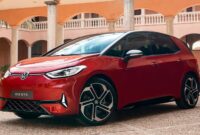Amid increasingly stringent emissions regulations and higher taxes on cars with large-displacement engines, the future doesn’t look good for performance vehicles powered by combustion engines. Hyundai just killed the i20 N and i30 N in Europe where automakers face the toughest legislation in the world. However, not all hope is lost for a fun car with an internal combustion engine.
Speaking with Australian magazine Drive, Hyundai’s current Executive Technical Advisor and former R&D boss said a hybrid powertrain is an opportunity worth exploring. Albert Biermann – who was one of the driving forces behind the creation of the N division – confirmed more potent hybrid setups are being developed. Not just for the Hyundai brand, but also for the luxury-oriented Genesis marque. As a reminder, the Hyundai Motor Group also owns about a third of Kia.

21 Photos
Biermann said the Elantra N (aka i30 Sedan N) “could be an option – technically it’s in there.” He refrained from confirming whether the performance sedan will be electrified but admitted it’s technically possible. Let’s keep in mind that Hyundai has already confirmed a next-generation model with a gasoline engine, suggesting it might even get a bigger ICE. The turbocharged 2.5-liter unit would be a nice bump over the existing 2.0-liter engine.
In its current form, the Elantra N has 276 horsepower whereas the larger engine is rated at 290 hp in the Sonata N Line and as much as 300 hp in the Genesis G70. Of course, adding an electric motor would increase the output even more. If approved, it might not be the only hybrid N car from Hyundai as Biermann says he is trying to convince the higher-ups to green-light a smaller electrified N. However, the project is still in its infancy.
Hyundai is already looking ahead, having just launched the fully electric Ioniq 5 N crossover. There are also reports of an Ioniq 6 N sedan, potentially with even more power. Biermann explained the Korean automaker wants to cover all the bases by catering to different tastes while meeting ever-changing regulations. The ex-BMW M boss argued that a hybrid powertrain would bridge the gap between performance cars with pure combustion engine cars and full EVs.
Toyota has another idea of how sports cars with combustion engines might be saved. It’s toying around with the idea of making ICE run on hydrogen instead of gasoline. To that end, it has already built and tested prototypes of GR Yaris and GR Corolla hot hatches on the track.
On the same note, Austrian company AVL Racetech has engineered a turbocharged 2.0-liter four-cylinder engine that runs on hydrogen. It makes a healthy 405 horsepower and 375 pound-feet (508 Newton-meters) of torque.
Porsche has a different approach since it believes synthetic fuel could be a solution. It’s been producing nearly carbon-neutral e-fuel at its factory in Chile since late 2022 when it celebrated the milestone by filing up a 911. Although Porsche is part of the Volkswagen Group, VW brand boss Thomas Schäfer claims all this talk about prolonging the life of combustion engines is beating a dead horse. He claims discussions about e-fuels are “unnecessary noise” since combustion engines represent “old technology.”



